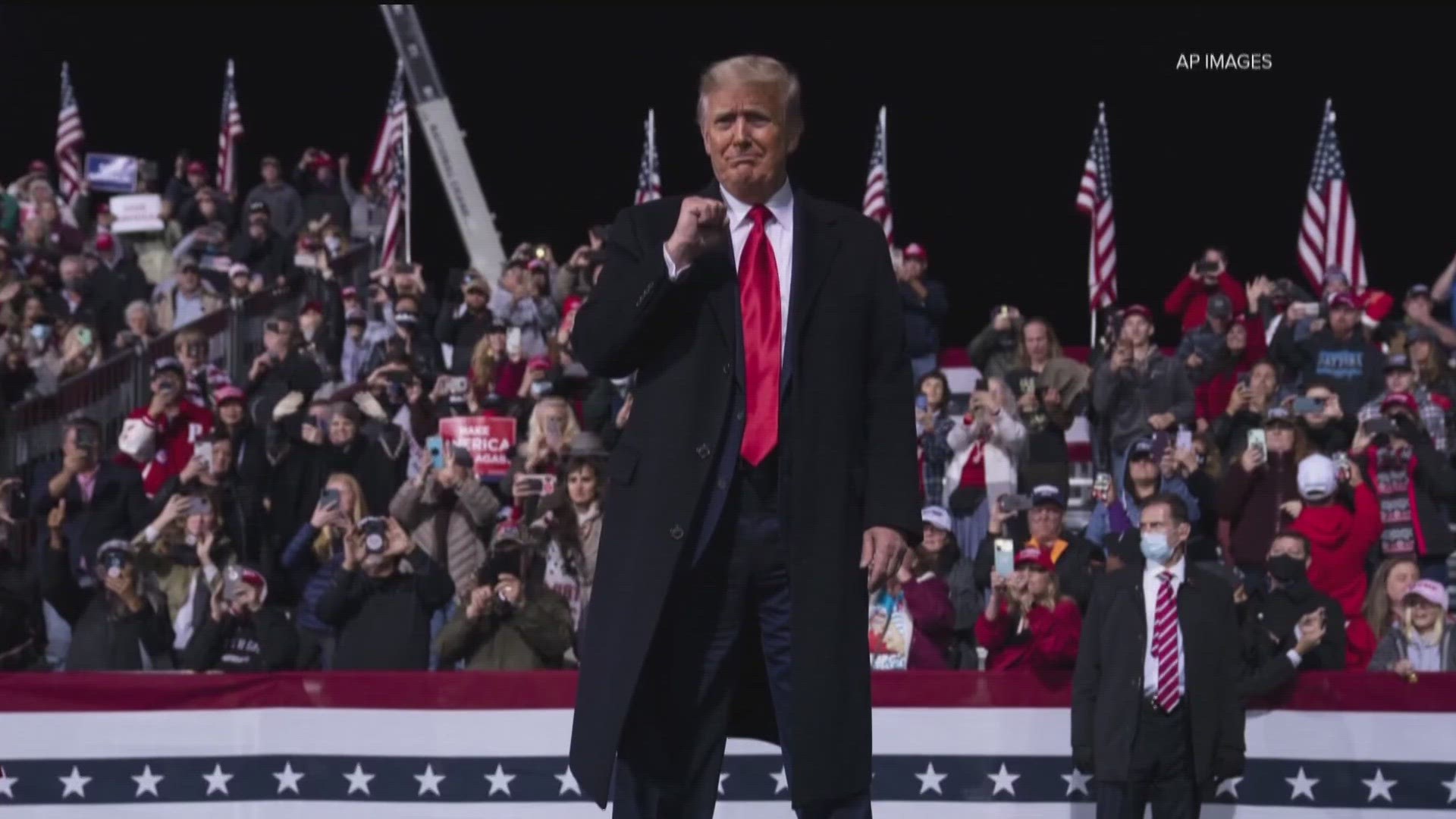ATLANTA — The Fulton County District Attorney's criminal investigation of former President Donald Trump continues to move forward while, in New York, Trump is now under indictment, facing criminal charges in a separate case.
Trump is expected to surrender to New York authorities next week -- the first former U.S. president in history to be indicted.
And legal analysts in Atlanta say there is nothing to stop Fulton County District Attorney Fani Willis from pursuing possible grand jury indictments of Trump, and others, on election interference charges and possibly racketeering charges -- even as Trump is being prosecuted on different criminal charges in New York.
There are both political and legal consequences.
What happens next in New York, with Donald Trump’s criminal indictment there, could forecast what Atlantans could expect if he’s also indicted in Fulton County.
“Well, look. The storm is coming, right? The storm is coming,” said former DeKalb County District Attorney Robert James Thursday evening.
“There are going to be protests,” James said. “We're going to see it in New York, but, on a larger scale, I think we're going to see it in Atlanta, because Georgia is still, for the most part, a red state. And the political dynamic, the body politic is a little different here. So the storm is coming.... There are going to be security concerns at any courthouse where there’s a prosecution of a former president.”
James believes the New York case against Trump, which has involved accusations of paying hush money over an alleged extramarital affair, is the weaker case compared to the Fulton County case against Trump, who could be accused of charges such as interfering with the election, racketeering and undermining democracy.
“All things being equal, assuming that both D.A. Willis and the prosecutor in New York both have very strong cases from an evidentiary standpoint, I would much rather have the Fulton County case,” James said. “Now, this is why. The case in New York is a case that a lot of people just are not going to care about. And that's just being candid. Nobody gets upset or is incensed that a millionaire or political official is taking campaign funds or any funds to pay their mistress to keep their mouth shut."
James added: "If you polled the general public, it's not the kind of thing that people are going to be upset about and is going to be the topic of Sunday dinner. However, the case in Georgia, the case in Atlanta, involves the former president allegedly calling everyone he could find in Georgia, including secretary of state, and asking them to go find votes. And that undermines our democracy. And that is something that affects everyone. And I'd much rather have that case because it's easier to sell to a jury and easier to make them care.”
Emory University Political Science Professor Dr. Andra Gillespie said Thursday that no matter how major or minor the charges might be against Trump in New York or in Atlanta, no one can claim that any former president is immune from being charged with misdemeanors or felonies.
“If George W. Bush had maliciously shot someone, or if Barack Obama had robbed a bank,” Gillespie said, “the fact that they're former presidents of the United States shouldn't absolve them from the responsibility to be held accountable for their actions.... And so, if President Trump is indeed innocent of these crimes, then what we need to do is we need to let the judicial process take its course. The president will have the opportunity to provide for an ample defense to be able to prove why he's worthy of being exonerated of these crimes.”
The district attorneys who are investigating Trump, Gillespie said, have their work cut out for them.
“These lawyers are going to have to make their case and they're going to have to prove beyond a reasonable doubt that President Trump did the things that they are accusing him of doing. So in that respect, the due process matters here. And he's going to get access to due process. He's not going to be denied those rights to have his day in court.”
Gillespie and James both say that a big part of what could determine the ultimate outcome of all of this would be finding jurors who could be impartial.
“Getting an indictment is relatively easy for a prosecutor,” James said. “And I've been a prosecutor, so I know about that. But when you talk about indicting and prosecuting and convicting a public official, you know, not even to mention the former president of the United States, that’s hard. And it’s hard not because the prosecutor in New York or the prosecutor in Georgia might or might not have the evidence. It’s hard because ultimately we have a jury system, and real people make these decisions, and folks come to a jury with their biases and their political views and even their agendas. And trying to overcome that is the real task in this case.”
“I think the real lesson to take away from this,” Gilliespie said, “is that if America is truly a nation of equals, then everybody has to be held to account with equal measure. And so you don't get a get-out-of-jail-free pass just because you happen to have served as president of the United States. And so we need to think about the equal application of the law and the importance of that. And that actually is a signal of America's greatness that even people who we hold in high esteem, who have held high political office, still have to be held accountable for their behavior when and if they stray. And the legal process will help to sort out whether or not there's any straying that's gone on.”

